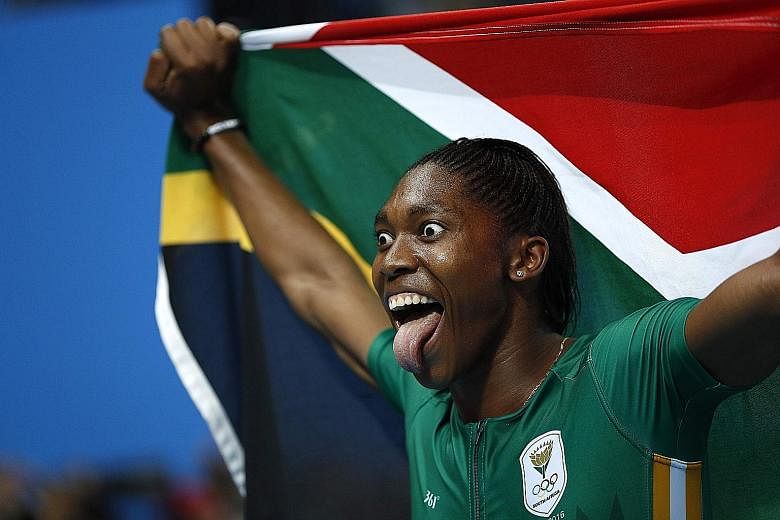RIO DE JANEIRO • Caster Semenya won the women's 800m in 1min 55.28sec on Saturday.
It was a personal best, a new South African national record and the fifth-fastest time in Olympic history. And it just may be that she never gets to run so fast again.
Semenya, 25, is hyperandrogenic and the International Association of Athletics Federations believes that she, and all other hyperandrogenic athletes, should not be allowed to compete unless they take action to suppress their naturally high testosterone levels.
The Court of Arbitration for Sport disagrees, and in July last year, it gave the IAAF two years to produce evidence proving exactly how much of an advantage hyperandrogenic runners had over everyone else.
Just two hours before her race, IAAF president Sebastian Coe said again that track and field's world body will soon go back to the CAS to try and overturn that decision. Coe is confident it will succeed.
Unlike the Briton, Semenya had refused to speak all week. She has grown sick of the scrutiny.
But winners are obliged to give press conferences, so on Saturday night, she had no choice.
She was so eloquent, those listening could be forgiven for wondering why she had not done it more before, until they remembered Semenya never asked to be put in this position, and that her body is no one's business but her own.
The athlete explained that Nelson Mandela had once told her "sport is meant to unite people" and that is what she is trying to do.
"I think I have made a difference," she said. "I have meant a lot to my people. I have done well. They are proud of me. And that was the main focus. I was doing it for my people, the people who support me."
Semenya is not the only hyperandrogenic woman competing in these Olympics, just the most successful.
It was the Indian sprinter, Duttee Chand, who took her case to the CAS, where she accused the IAAF of discriminating against her by setting an upper limit for the testosterone levels of female competitors.
But she did not make it through the 100m heats, and the IAAF is most concerned about the impact of hyperandrogeny in the middle- and long-distance events.
The unpalatable but unavoidable fact is that while the other two medallists, Burundi's Francine Niyonsaba (1:56.49) and Kenya's Margaret Wambui (1:56.89), have been identified as hyperandrogenic, both have not been subjected to the kinds of innuendo which Semenya has experienced.
All three were asked to comment on whether the IAAF had made them take hormone treatments to suppress their testosterone levels, and, if so, what effects those treatments had.
Semenya's times dropped considerably when she was taking the medication.
After a brief consultation with each other, all three refused to answer. "Let's focus first of all on the performance today, let's not focus on any medication," said Wambui.
Semenya replied: "Tonight is all about performance. We're not here to talk about the IAAF. We're not here to talk about speculation."
Indignation was swelling in Semenya's breast. And, when she let it rise, what poured forth was more than extraordinary.
Asked how, exactly, she felt she had made a difference to her sport, she replied: "I think it is all about loving one another. It's not about discriminating against people. It is not about looking at how people look, how they speak, how they run, it is not about being muscular. It is all about sport.
"When you walk out of your apartment, you think about performing, you do not think about how your opponent looks. So I think the advice from me to everybody is just to go out there and have fun."
Inspiring as her words were, the truth is that not many in the athletics world think like she does.
Britain's long-distance great Paula Radcliffe said on the BBC that Semenya and the other hyperandrogenic women should either "take the medication to suppress the levels or they choose to have an operation or they choose not to compete".
THE GUARDIAN, AGENCE FRANCE-PRESSE

